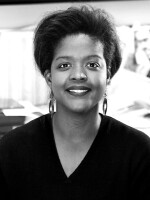RENEE MONTAGNE, host:
And diplomats from the United Nations security council are gathered in Darfur today. Five years of fighting in that western part of Sudan has left hundreds of thousands of people dead, and millions more driven from their homes. The Security Council has a raft of meetings scheduled, among them, talks with their own peacekeeping team in the region. As NPR's Gwen Thompkins found, the trouble is, there's not much peace to keep.
GWEN THOMPKINS: A line of white land cruisers has assembled in the last cool moments of morning in Darfur. From a distance, they look like a half tray of ice cubes against a desert landscape, glinting and gleaming into a rising sun. It's that time again. The motors are running, the doors are slamming, and there's an armored personnel vehicle with manned gun stations at the front and the caboose. The vehicles in between are carrying more cops than a season of "Law and Order." We're heading to the Zam Zam Camp for displaced people just outside Al Fashir. These cops turned peacekeepers are charged with building confidence there, where confidence is hard to come by.
GRACE (Police Officer): These people have lost whatever they have gathered in life. In fact, they are empty now.
THOMPKINS: That's Grace, a Nigerian Police officer. She's sitting next to me, and she prefers to be known only as Grace. She says it's her duty as a peacekeeper to build people's confidence at the displacement camp and let them know that there's hope. But these forces could use some confidence building, too. They often travel unarmed and without a military escort. Maybe that's why Grace doesn't take chances. She may be the only peacekeeper in the convoy today wearing a helmet and a bulletproof vest.
UNAMID, the joint United Nations African Union peacekeeping team in Darfur, is supposed to be 26,000 strong. And yet there are fewer than 10,000 of them on increasingly dangerous ground. The first stop we make is at a dusty little hut about 10 minutes from the UNAMID compound. Here, the convoy offers elaborate greetings to representatives of the government of Sudan and asks permission to enter the Zam Zam Camp. It's the Darfurian salute. In this part of the world, saying hello is only the beginning of saying hello. That means getting out of the vehicle, touching the local officer on the shoulder or the heart, clapping hands, and a loud and zesty shake, and catching up on all that has transpired since the last time you clapped hands. And at the end, profuse thanks.
Unidentified Man: (Through translator) He says I'm welcome. Also, he give other permission to go the Zam Zam Camp.
Unidentified Man: Thank you, man, oh, thank you very much. (unintelligible)
THOMPKINS: Five minutes later, just down the road, the same thing happens all over again.
(Soundbite of laughter)
THOMPKINS: The convey now has to pay respects to the Darfurian rebels who really control the camp. This faction is working with the government, although the partnership is not always friendly. It's an entirely different scene than Elizabeth Ofarearya(ph) is used to. She's a detective in Ghana. She's been working murder cases, sex crimes, theft. Now she concentrates on the women in Darfur. They'll only talk to the female peacekeepers.
Detective ELIZABETH OFAREARYA (Ghanaian Detective): I help them fetch water. I help them do a lot of things. When I see the children walking about, some crying, I carry them in my arms, I console them, I do a lot of things. In fact, I take them as my sisters, their children like my own children.
THOMPKINS: UNAMID personnel are not allowed to make arrests in criminal cases or to involve themselves in local politics. And that's a shame, because on any given night, Al Fashir could use some law and order. Here, the sun sets to gunfire. Rebels, Arab militia and Sudanese police have been seen looting in and around the city in broad daylight. And just recently, a UNAMID peacekeeper was killed nearby. Today, Zam Zam is quiet, which is quite a feat for a population of 62,000. But on the way back, we see a couple of teenagers with AK-47s slung casually over their shoulders. The peacekeepers go quiet, and you can just feel the confidence draining from the vehicle.
Gwen Tompkins, NPR News, Al Fashir. Transcript provided by NPR, Copyright NPR.






